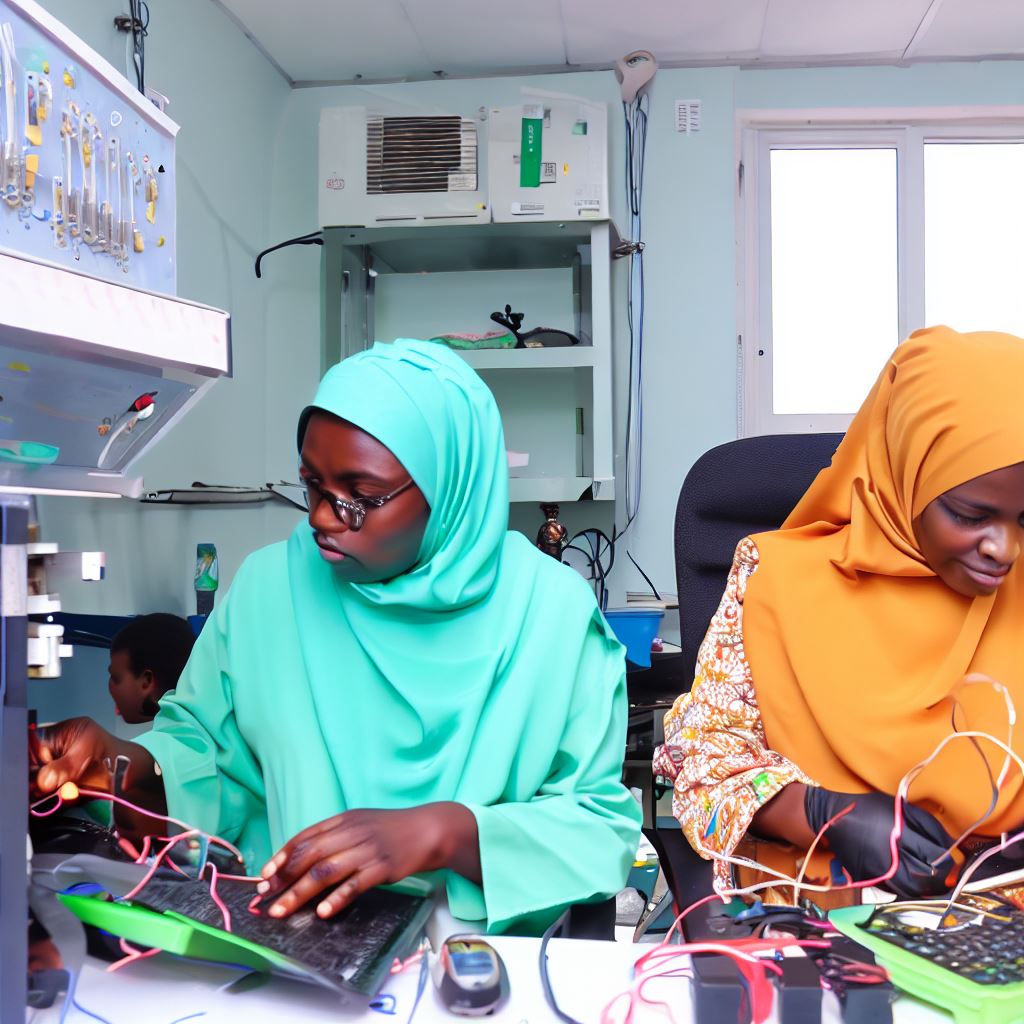Introduction
Photonics is a field of study and innovation that deals with the manipulation and control of light particles and waves.
It has immense significance in various industries, such as telecommunications, healthcare, and manufacturing.
As technology continues to advance, there is a growing demand for photonics experts in global economies.
These experts are needed to develop and implement cutting-edge optical technologies that can improve efficiency and productivity in various sectors.
Overview of Nigeria’s economy
- Nigeria is one of the leading economies in Africa and has experienced significant growth in recent years.
- Its population of over 200 million people makes it the most populous country on the continent.
- The country is rich in natural resources, including oil, which has been a major driver of its economy.
A. Nigeria’s position as a major African economy
- Nigeria has the largest economy in Africa, with a GDP of over $400 billion.
- It is considered one of the “Next Eleven” countries with the potential to become the world’s largest economies in the 21st century.
- The Nigerian Stock Exchange is the second-largest in Africa, reflecting the country’s economic significance.
B. Sectors contributing to Nigeria’s GDP
- The oil and gas sector has historically been the main contributor to Nigeria’s GDP, accounting for a significant portion of government revenue.
- However, there has been a growing diversification of the economy, with sectors such as telecommunications, agriculture, and banking playing a crucial role.
- Telecommunications, in particular, has witnessed rapid growth, with Nigeria being the largest telecom market in Africa.
C. Increasing focus on technology and innovation in Nigeria
- Nigeria has recognized the importance of technology and innovation in driving economic growth and development.
- Several initiatives, such as the establishment of technology hubs and investment in research and development, have been undertaken to foster innovation.
- The government has also implemented policies to attract foreign direct investment in the technology sector.
D. Opportunities in photonics expertise
- With the increasing emphasis on technology and innovation, there is a growing demand for experts in photonics in Nigeria.
- Photonics is the science and technology of generating, controlling, and detecting photons (particles of light) and has a wide range of applications.
- In Nigeria, photonics experts are needed in various sectors, including telecommunications, healthcare, energy, and manufacturing.
- These experts are crucial in developing and implementing advanced technologies, improving communication networks, and enhancing healthcare diagnostics.
- The demand for photonics expertise is expected to continue growing as Nigeria strives to become a knowledge-based economy.
E. The importance of investing in photonics education
- To meet the increasing demand for photonics experts, it is vital for Nigeria to invest in photonics education and training.
- Universities and educational institutions should establish dedicated programs and courses in photonics to equip students with the necessary skills and knowledge.
- The government and industry should collaborate to provide scholarships, research grants, and internships for aspiring photonics professionals.
- By investing in photonics education, Nigeria can build a strong pool of talent to drive technological innovation and economic growth.
- Furthermore, this will provide opportunities for job creation and contribute to reducing unemployment rates in the country.
In fact, Nigeria’s economy has experienced significant growth, and there is an increasing focus on technology and innovation.
This has created a demand for photonics experts in various sectors.
By investing in photonics education, Nigeria can harness the potential of this field and drive economic development.
Read: Networking for Librarians in Nigeria: A How-To Guide
Understanding Photonics
Photonics is the study and application of light, including its generation, manipulation, detection, and transmission.
It encompasses various technologies and techniques that use photons, the fundamental particles of light.
A. Defining photonics and its applications
- Photonics involves the use of lasers, LEDs, optical fibers, and other devices for practical purposes.
- Its applications range from telecommunications to healthcare and from energy to manufacturing.
- In telecommunications, photonics enables high-speed data transmission through optical fibers.
- In healthcare, photonics plays a crucial role in medical imaging and diagnostics.
- Photonics is also used in energy technologies such as solar cells and LED lighting.
- Furthermore, photonics has applications in manufacturing processes like laser cutting and 3D printing.
B. The relevance of photonics to various sectors
- In the telecommunications sector, photonics enables faster and more reliable data transmission.
- It allows for high-capacity communication networks, supporting increasing demand for data.
- Photonics is essential in healthcare for various imaging techniques, including X-rays and MRIs.
- These technologies aid in the diagnosis and treatment of diseases, improving patient care.
- In the energy sector, photonics contributes to the development of efficient solar energy systems.
- It helps convert sunlight into electricity through the use of photovoltaic cells.
- Moreover, photonics enables the creation of energy-efficient LED lighting, reducing energy consumption.
- In manufacturing, photonics plays a vital role in precision cutting and welding using lasers.
- It also enables the production of complex components through additive manufacturing techniques.
C. How photonics can drive economic growth and development
The demand for photonics experts in various sectors presents significant opportunities for economic growth and development in Nigeria.
- Photonics research and development can lead to the creation of new technologies and products.
- These innovations, in turn, can boost productivity and competitiveness in industries.
- Investments in photonics infrastructure and education can create employment opportunities.
- Skilled photonics experts can contribute to the growth of specialized industries in Nigeria.
- The application of photonics in telecommunications can enhance connectivity and digitalization.
- This enables the expansion of e-commerce, online services, and digital entrepreneurship.
- In healthcare, photonics improves access to advanced diagnostic tools and medical treatments.
- This can enhance healthcare outcomes and attract medical tourism, generating economic revenue.
- Photonics also supports the development of clean energy technologies, reducing dependency on fossil fuels.
- This contributes to sustainable economic growth and environmental preservation.
In short, photonics is a multidisciplinary field with numerous applications in various sectors.
Understanding its relevance to sectors like telecommunications, healthcare, and energy is crucial for harnessing its potential for economic growth and development in Nigeria.
By investing in photonics education, infrastructure, and research, Nigeria can position itself as a hub for photonics expertise, creating opportunities for job creation, technological innovation, and sustainable economic progress.
Read: Salaries of Photonics Specialists in Nigeria
Demand for Photonics Experts in Nigeria
Nigeria’s economy is rapidly evolving, and advancements in technology have led to an increasing need for photonics experts in the country.
However, the current shortage of professionals in this field poses significant challenges.
A. The current shortage of photonics experts in Nigeria
- The field of photonics is relatively new in Nigeria, leading to a limited number of experts.
- Universities and technical institutions in the country offer few specialized programs in photonics.
- There is a lack of awareness and understanding about the importance of photonics among students and parents.
- Few opportunities for research and development in photonics exist in Nigeria.
- The brain drain phenomenon, where skilled professionals leave the country for better opportunities abroad, further worsens the shortage.
B. Challenges faced in meeting the demand for photonics experts
- The limited number of educational institutes offering courses in photonics makes it difficult to produce enough skilled professionals.
- The high cost of equipment required for photonics research and development poses financial challenges.
- The lack of industry collaboration and support for photonics initiatives hinders the growth of expertise in the field.
- Absence of government policies and funding specifically directed toward nurturing the photonics sector in Nigeria.
- Inadequate infrastructure, such as proper laboratory facilities, slows down the training and practical exposure of students.
C. The reasons behind the increasing need for photonics experts in Nigeria
- Photonics has applications in various sectors, including telecommunications, healthcare, defense, and energy.
- The growing demand for high-speed internet and advanced communication systems requires photonics expertise.
- Photonics plays a vital role in medical imaging technologies, such as X-rays and MRI scanners.
- Improved solar energy technologies rely on photonics for efficient conversion and harvesting of light.
- Photonics is crucial for the development of advanced security and surveillance systems.
In essence, the demand for photonics experts in Nigeria is increasing due to its wide-ranging applications and contributions to various sectors of the economy.
However, the country faces challenges in meeting this demand, including a current shortage of professionals and limited educational opportunities.
Addressing these challenges will require greater investment in specialized programs, infrastructure, and industry collaboration, as well as government support.
By nurturing the photonics sector, Nigeria can benefit from the advancement of technology and drive economic growth.
Read: Libraries in Nigeria: Librarian’s Role and Influence

Opportunities for Photonics Experts in Nigeria
Photonics, the science, and technology of generating and controlling light, offers numerous opportunities for experts in Nigeria’s evolving economy.
As the world becomes increasingly reliant on technology, the demand for individuals skilled in photonics is skyrocketing.
A. Job Opportunities in Different Sectors
Photonics experts in Nigeria can find employment opportunities in various sectors, including telecommunications, healthcare, and manufacturing.
- Telecommunications: With the growing need for high-speed internet and data transmission, photonics experts can contribute significantly to the development of advanced fiber optic networks.
- Healthcare: Photonics plays a crucial role in medical diagnostics, imaging, and therapeutics. Skilled experts can contribute to enhancing healthcare services in Nigeria.
- Manufacturing: The manufacturing industry can greatly benefit from photonics experts in areas such as quality control, material processing, and product development.
B. Benefits of Pursuing a Career in Photonics in Nigeria
Embarking on a career in photonics in Nigeria offers numerous rewards and benefits, making it an attractive field for professionals to consider.
- High Demand: There is an increasing demand for photonics experts both locally and globally, offering a plethora of job opportunities.
- Lucrative Salaries: Photonics professionals often command higher salaries due to their specialized skills and the industry’s growing demand.
- Innovation and Advancement: Working in photonics allows individuals to be at the forefront of technological advancements, making significant contributions to society.
- Global Collaboration: Photonics is an international field that encourages collaboration with experts from around the world, broadening professional networks.
C. Impact of Photonics on Nigeria’s Economic Growth and Job Creation
The adoption and growth of photonics in Nigeria can have a profound impact on the country’s economic growth and job creation.
- Economic Growth: By integrating photonics into industries such as telecommunications, healthcare, and manufacturing, Nigeria can boost productivity and attract foreign investments.
- Job Creation: The expansion of the photonics industry will create a substantial number of job opportunities for skilled professionals, reducing unemployment rates.
- Technological Advancements: Embracing photonics will enable Nigeria to keep pace with global technological advancements, fostering innovation and competitiveness.
- Knowledge Transfer: Collaborations and partnerships with international photonics experts will facilitate knowledge transfer and capacity building in Nigeria.
In general, the demand for photonics experts in Nigeria’s economy presents immense opportunities for individuals seeking a rewarding career path.
The potential job opportunities in various sectors, coupled with the benefits of pursuing a career in photonics, make it a promising field.
Furthermore, the integration of photonics into Nigeria’s economic landscape can stimulate growth, create jobs, and foster technological advancement.
It is crucial for the government, educational institutions, and industry stakeholders to recognize and invest in this thriving sector to unlock Nigeria’s full potential in photonics.
Read: Women in Nigeria’s Librarian Profession: Spotlight
Steps to Become a Photonics Expert in Nigeria
A. Educational and Professional Requirements
Becoming a photonics expert in Nigeria requires a strong educational background in physics or electrical engineering.
Aspiring professionals should start by obtaining a Bachelor’s degree in either of these fields.
This foundational knowledge will lay the groundwork for a successful career in photonics.
In addition to a degree, practical experience is crucial in the photonics industry.
Aspiring experts should seek opportunities to gain hands-on experience through internships, research projects, or collaborations with industry professionals.
This practical exposure will help individuals understand the practical applications of photonics concepts.
While a Bachelor’s degree is sufficient for entry-level positions, obtaining a Master’s or Ph.D. is highly recommended for those aspiring to specialize in photonics.
Advanced degrees allow individuals to explore complex topics within the field and conduct independent research, contributing to the advancement of photonics technology in Nigeria.
B. Training Programs and Institutions
Nigeria has several institutions and programs that offer courses in physics, electrical engineering, and photonics.
Prominent universities like the University of Lagos, University of Nigeria, and Ahmadu Bello University provide undergraduate and postgraduate programs relevant to photonics.
These institutions offer a solid academic foundation that can be built upon throughout one’s career.
Additionally, the National Center for Remote Sensing (NCRS) in Nigeria offers training programs and conducts research in various fields, including photonic technology.
These programs provide participants with practical skills and theoretical knowledge necessary for a career in photonics.
The Nigerian Institute of Physics (NIP) also plays a vital role in developing photonics expertise.
The institute organizes workshops, conferences, and seminars that focus on the latest developments in photonics.
Attending these events can enhance knowledge and provide valuable networking opportunities.
C. Continuous Learning and Skill Development
The field of photonics is rapidly evolving, and it is essential for experts to keep up with the latest advancements.
This requires a commitment to continuous learning and skill development.
Professionals can stay updated by regularly reading research papers, scientific journals, and attending conferences related to photonics.
These resources provide insights into new technologies, techniques, and applications in the field.
Joining professional organizations like the Nigerian Optics and Photonics Society (NIOPS) can also be highly beneficial.
These organizations offer access to training resources, networking opportunities, and collaboration platforms for photonics experts.
Engaging with fellow professionals in the field allows individuals to exchange knowledge and stay at the forefront of photonics research and development.
Furthermore, individuals can enhance their skillset by pursuing certifications or advanced courses in specialized areas within photonics.
These courses provide a deeper understanding of specific topics and equip professionals with specialized skills that are in high demand.
In a nutshell, becoming a photonics expert in Nigeria requires a solid educational foundation in physics or electrical engineering, practical experience, and continuous learning.
By following these outlined steps, aspiring professionals can pave their way to a successful career in the photonics industry.
Government Support and Initiatives
A. Government efforts in promoting photonics education and research in Nigeria
Government support and initiatives play a crucial role in developing the demand for photonics experts in Nigeria’s economy.
The government has been making efforts to promote photonics education and research in the country.
B. Initiatives and policies aimed at attracting and retaining photonics experts
One of the notable government initiatives is the establishment of specialized institutions and centers for photonics education and research.
These institutions provide quality education and training in the field of photonics, grooming experts who can contribute to the economy.
The government has also been actively involved in funding research projects in photonics.
These initiatives encourage scientists and researchers to explore new advancements in the field and develop innovative solutions.
By providing financial support, the government ensures that research efforts are sustained and progress is made.
In addition to education and research, the government has implemented policies aimed at attracting and retaining photonics experts.
These policies include tax incentives, grants, and subsidies for companies and individuals engaged in photonics-related activities.
Such measures create a favorable environment for experts to flourish and contribute to the economy.
C. The importance of government support in nurturing the photonics ecosystem in the country
Government support is crucial in nurturing the photonics ecosystem in the country.
It provides the necessary infrastructure, resources, and funding to establish research facilities, laboratories, and manufacturing units.
These facilities create an environment conducive to the growth of the photonics industry and attract experts from various domains.
The photonics industry has significant applications in various sectors, including telecommunications, healthcare, and energy.
Therefore, government support in nurturing the photonics ecosystem is vital to harness the potential of this technology for economic development.
Furthermore, by supporting photonics education, the government ensures a steady supply of skilled professionals in the field.
This helps meet the growing demand for photonics experts, both in the domestic market and globally.
Skilled manpower is crucial for the competitiveness and growth of the photonics industry in Nigeria.
Government initiatives and policies also foster collaboration between academia, industry, and research institutions.
This collaboration stimulates innovation and the development of cutting-edge technologies.
It allows experts to work together and leverage each other’s expertise, leading to advancements in the field of photonics.
To summarize, government support and initiatives are vital for nurturing the demand for photonics experts in Nigeria’s economy.
By promoting photonics education, providing funding for research, and implementing policies to attract and retain experts, the government plays a crucial role in developing the photonics ecosystem.
This, in turn, contributes to economic growth and technological advancement in the country.
Explore Further: Nigeria’s Space Missions: The Scientists Behind Them
Conclusion
The demand for photonics experts in Nigeria’s economy is significant and offers excellent opportunities for growth.
With the increasing reliance on technology and innovation, the field of photonics plays a crucial role in various sectors.
The potential for growth in photonics is immense, as it is a rapidly advancing field that is expected to contribute significantly to Nigeria’s economic development.
The demand for experts in this field is expected to rise in the coming years.
Therefore, individuals who are considering a career in photonics can find numerous opportunities to contribute to Nigeria’s economic growth.
By pursuing a career in this field, individuals can help bridge the skills gap and contribute to the country’s technological advancement.
It is crucial for individuals, especially young students, to consider a career in photonics.
By doing so, they can not only build a promising career for themselves but also actively participate in Nigeria’s economic development.
Ultimately, the demand for photonics experts in Nigeria offers immense potential for growth and development.
Consider a career in photonics and contribute to Nigeria’s economic advancement!




